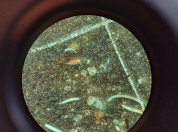Silva, Cunha, Pellegrinetti, Boleta, Zagatto, Zagatto, Nishisaka, Mafra, Patreze, Custer, Dini-Andreote, Mendes, Tsai, Mendes
Drought stress threatens global food security, highlighting the need for resilient crops. Harnessing rhizosphere microorganisms can improve plant performance in harsh conditions. Here, we investigated the rhizosphere microbiomes of drought-tolerant (BAT477, SEA5) and susceptible (IAC Milênio, IAC-Carioca 80SH) common bean cultivars (Phaseolus vulgaris L.) under contrasting water regimes in mesocosm experiments to assess microbiome functional modulation under drought. Analysis of plant growth, physiological responses, nutrient dynamics, and rhizosphere microbial functional diversity revealed that drought-tolerant cultivars exhibited greater water management, minimal growth reductions, and enrichment of beneficial microbial functions, including genes linked to drought tolerance. Notably, drought stress triggered differential abundance in 1864 microbial genes, highlighting a robust functional shift. Specifically, drought-tolerant cultivars showed an enrichment of genes related to osmotic response, photosynthetic efficiency (82–87 % reduction in photosynthesis in susceptible cultivars), oxidative stress mitigation, and osmoprotectant production, whereas susceptible cultivars relied more on genes associated with DNA repair and antioxidant defense, indicating a reactive rather than proactive stress response. Additionally, the rhizosphere microbiomes of drought-tolerant cultivars were enriched in functions related to biofilm formation, dormancy survival, and oxidative stress resistance. These cultivars also maintained higher photosynthetic activity and transpiration rates with more stable stomatal conductance. Upon rehydration, they partially restored physiological functions (e.g., 48–57 % recovery in photosynthesis), further demonstrating microbiome-conferred resilience. These findings underscore the potential of plant-microbiome interactions in adapting to water stress, suggesting that microbiome selection could be a promising strategy for developing drought-resilient crops and advancing sustainable agricultural practices.
